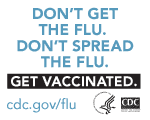CDC Features
Past to Present: Non-Traditional Roles for Nurses at CDC and ATSDR
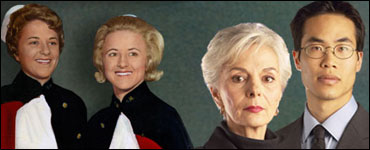
National Nurses Week is celebrated annually from May 6 through May 12. It falls on the birthday of Florence Nightingale, the founder of modern nursing. The theme for National Nurses Week, 2008 is Nurses: Making a Difference Every Day.
Approximately 150 registered nurses work at CDC and ATSDR in a variety of programs and settings. About half of the nurses work in chronic and infectious disease programs, while many others work in occupational safety and health, environmental health, injury prevention and control, preparedness and emergency response, health marketing, and global health. Several nurses provide clinical care, but most work as epidemiologists, health scientists, advisors, coordinators, directors, Epidemic Intelligence Service (EIS) officers, behavioral scientists, communication specialists, and more.
CDC and ATSDR nurses are employed through various mechanisms, including the federal civil service system, the US Public Health Service as Commissioned Corps (USPHS) officers, contracting agencies, and more. Many have master's degrees, and some have doctoral degrees.
Nurses Helping to Improve Health, Safety, and Quality of Life
Below we spotlight just a few of the many nurses at CDC and ATSDR that work to help improve the health, safety, and quality of life of people in the United States and abroad.
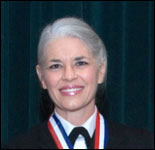
Polly Marchbanks, PhD, MSN, BSN (CAPT, USPHS). Photo by Greg Knobloch.
Polly A. Marchbanks, PhD, MSN, BSN (CAPT USPHS), is a nurse-epidemiologist working in CDC's Division of Reproductive Health and was a former EIS Officer. CAPT Marchbanks was recently recognized for her superior accomplishments toward research and training in applied epidemiology in the field of reproductive health, and in particular, studies related to fertility epidemiology. She was one of the recipients of the 2007 William C. Watson, Jr., Medal of Excellence, the highest honor bestowed by the CDC and ATSDR. Marchbanks believes nursing is an excellent foundation for epidemiology. She comments, "My nursing background helps me view epidemiologic issues more holistically, and it helps me be a compassionate epidemiologist who can more easily see the faces behind the statistics."
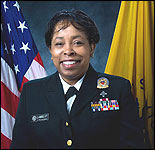
Mary I. Lambert, MN, RN, (CAPT USPHS). Photo by Greg Knobloch.
Mary I. Lambert, MN, RN (CAPT USPHS), was recently named Chief Management Official for CDC's Coordinating Office for Terrorism Preparedness and Emergency Response. She has primary oversight and responsibility for all programs that comprise CDC's terrorism preparedness and emergency response portfolio. She worked on multiple deployments in the District of Columbia, including those related to the September 11, 2001 events and the Capitol area anthrax exposure event. Her career thus far has included assignments within the Department of Health and Human Services, Department of Homeland Security, Department of Veteran's Affairs, Department of Defense, private sector, and the White House. Lambert says she regards nursing as "the firm foundation for my achievements."
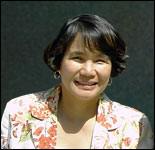
Lilia Ponce Manangan, RN, MPH. Photo by Linda Leary.
Lilia Ponce Manangan, RN, MPH, is currently an epidemiologist with the Division of Tuberculosis (TB) Elimination. She recently published the findings of a study on costs incurred by health departments in managing suspected TB patients. She analyzes data from the national TB surveillance system to monitor TB trends, especially among Asian/Pacific Islanders, to help reduce the disproportionate burden of TB in minorities in the United States. She is also the project officer of the National Surveillance of Severe Adverse Events Associated with Treatment of Latent TB Infection. Manangan attributes her nursing knowledge and skills to her ability to adapt very well to new environments and challenges throughout her 25-year career at the Indian Health Service and CDC.
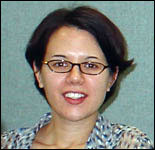
Michele Hlavsa, RN, MPH. Photo by Alicia Cronquist.
Michele Hlavsa, RN, MPH, is an epidemiologist in the Division of Parasitic Diseases. She focuses on recreational water (i.e., water in swimming pools, spas, lakes, rivers, or oceans) and healthy swimming. She collaborates with state and local public health partners in investigating outbreaks of recreational water illness (gastrointestinal, dermatological, respiratory, and other illnesses that are spread by swallowing, breathing, or having contact with contaminated recreational water). She also studies the number of annual swimming visits in the United States and the reasons why people continue to swim while ill with diarrhea. She and the team also try to identify factors contributing to the two plus-fold increase in reported cases of cryptosporidiosis over the last few years. Her nursing background gives her a clearer understanding of the clinical aspects of epidemiological investigations, allowing her to more effectively collect and analyze data. Hlavsa comments, "My nursing background helps me look at the complex, multi-dimensional issue of healthy swimming from a holistic perspective."
CDC's Safe Water Team, which includes Amy Parker, MSN, MPH (LCDR USPHS), Pat Riley, CNM, MSN (CAPT USPHS), and Rob Quick, MD (CAPT USPHS), was chosen to receive the 2007 Circle of Excellence Award from the Henry M. Jackson Foundation for the Advancement of Military Medicine in the category of prevention. The team was honored for their initiative and vision in introducing, implementing and evaluating the Safe Water System, an innovative point-of-use water treatment and hand washing intervention, in a pilot program in a maternal and child health clinic in Kenya. The award was presented formally at the 113th Annual Meeting of the Association of Medical Surgeons of the United States in November, 2007. Amy Parker, MSN, MPH, is an epidemiologist in CDC's Division of Viral Diseases. She comments, "My background in nursing has given me an excellent foundation for the work I do in public health." Pat Riley, CNM, MSN, is a Senior Technical Advisor in CDC's National Center for HIV/AIDS, Viral Hepatitis, STD, and TB Prevention, Human Capacity Development. She says, "Nursing provided me a pathway to a career in global health- an area that has remained my passion since my service as a Peace Corps volunteer in Senegal some 35 years ago."
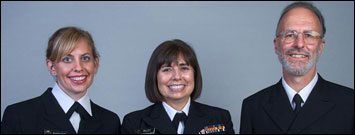
Safe Water Team: From left to right, Amy Parker, MSN, MPH (LCDR USPHS), Pat Riley, CNM, MSN (CAPT USPHS), and Rob Quick, MD (CAPT USPHS). Photo by Greg Knobloch.
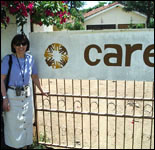
Pat Riley in front of a CARE sign; CDC collaborated with CARE-Kenya on the project. Photo by Amy Parker.
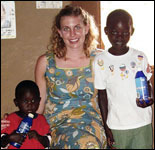
Amy Parker with Kenyan children holding bottles of the chlorine disinfectant used to treat drinking water. Photo by Charles Komolleh (a Kenyan on the CARE-Kenya team).
For More Information
- ATSDR Environmental Health Nursing Initiative
- CDC Registered Nurses
- CDC Training and Continuing Education Online
- DES Materials for Nurses
- Get Smart. Know When Antibiotics Work
- Women's Health Professional Materials
- Important Message to Nurses
- MMWR Continuing Education
- Preparedness Resources for Nurses Collaboration Group
- Primary Care Counselors Ease Burden on Overworked Nurses
- Protecting Nurses at the Frontlines of Patient Care
- American Nurses Association*
- American Public Health Association: Public Health Nursing*
- Quick Facts on Registered Nurses, US Department of Labor
- Nurses at CDC*, American Journal of Nursing
- US Public Health Service Commissioned Corps
- Coordinating Office for Terrorism Preparedness & Emergency Response
- Division of Reproductive Health
- Division of Tuberculosis Elimination
- Healthy Swimming
- Recreational Water-Associated Illnesses
- Safe Water System
Page last updated: May 5, 2008
Content source: CDC Office of Women's Health, CDC Office of Enterprise Communication
Content owner: National Center for Health Marketing
URL for this page: www.cdc.gov/Features/NursesWeek
*Links to non-federal organizations are provided solely as a service to our users. These links do not constitute an endorsement of these organizations or their programs by CDC or the federal government, and none should be inferred. CDC is not responsible for the content of the individual organization Web pages found at these links

